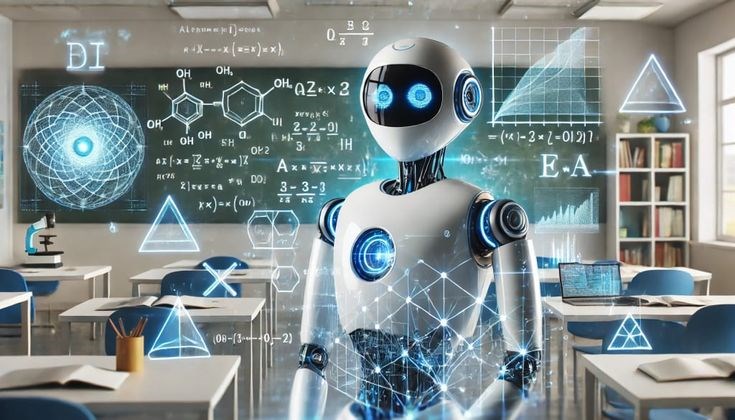Mathematics is usually developed by human intuition and this process is usually very slow. Artificial Intelligence proves to increase the speed of discovery in mathematics. It does so by using massive computational resources to seek solutions to complex problems exhaustively and cogent patterns in large datasets too complex to be discovered by a human. Complex proofs are also formally proved using AI systems like theorem provers and other symbolic reasoning engines. These features enable AI to increase researchers on a massive scale. AI is a force multiplier because it scales up exploration, pattern recognition, formulation, and verification of conjectures. This has a direct implication of accelerated development in mathematical research.
Automating Mathematical Grunt Work
The mathematical discovery supported by AI can be proven to be faster since tedious and time-consuming tasks are automated. It can perform huge computations, brute-force searches over solution spaces much larger than can (now) be done by a human, and check complicated proof steps orders of magnitude more quickly than humans. Such automation liberates the mathematicians from grunt work. They are therefore able to utilize their mental cognitive ability towards advanced thoughts and conceptual thinking as well as strategic thinking behavior. Moreover, AI is capable of searching through complicated mathematical constructions and discovering a possible pattern or a counterexample that may be too hard to detect by a human brain. Although AI will never substitute deeper mathematical insight, the research cycle will become much shorter, with the resulting ability to scale up the size of solvable problems.
Pattern Recognition: AI's Discovery Engine
Pattern Recognition: Discovery Engine in AI facilitates mathematical discovery. Ingredients are produced according to complicated schemes that humans may not recognize in large volumes of mathematical data recognized by AI systems. Such ability accelerates discovery by creating new conjectures on the basis of regularity observations. AI effectively searches the vast solution space looking for counterexamples or to prove complicated paths. AI shortens the time it takes scientists to develop new theories and arrive at mathematical conclusions by automating the process of discovering deep structural links and proposing areas to research. Its pattern recognition makes it go fast.
Human-AI Collaboration in Math
Human-AI-collaboration is based on the fact that mathematicians and artificial intelligence have complementary talents. AI is particularly good at extremely large amounts of data, detecting complicated patterns, thoroughly searching solution spaces and checking proofs. It produces speculations and processes tedious calculations very quickly as compared to humans working in isolation. Human mathematicians bring in vital intuition, strong conceptual knowledge, imaginative approach to problem posing, and plans of action. They analyze the results of AI and make assessments of importance. Such synergy accelerates the speed at which mathematics is discovered: AI can quickly suggest directions and computationally intensive procedures, but human beings will steer the search and offer critical suggestions.
Challenges of AI-Assisted Proofs
The AI-aided proofs pose great challenges in order to achieve reliable rapid mathematical discovery. Verification problem: The steps of a proof made by AI may take so much time to make it possible to find mistakes, making any possible improvement of time useless. An issue related to interpretability is a block to progress since AI models are usually black boxes. Without reasoning, mathematicians are not easily able to comprehend, believe or add AI generated arguments. In addition, there is complexity of integration. The gap between the AI-generated outputs and demanding mathematics working processes needs new methodologies. The need to be human-verified and understood by people is a persistent bottleneck to its capability of achieving the promised continuous speed up in the discovery process.
Accelerating Math's Future Pace?
It is proved that AI stimulates the rate of mathematical discovery. It works as a powerful instrument, seeking through far-reaching information that can be well beyond the ability of humans to recognize complicated patterns and draw speculations. The machine learning algorithms investigate complex problem areas and identify counterexamples effectively. Proof assistant theorem provers give an extra level of assurance through rigorous verification of a proof. This ability enables researchers to do more conceptual work. Although at the current stage, AI needs human assistants to frame problems and interpret them, its computational capabilities, pattern identification, and confirmation functions greatly accelerate the process of research. Since AI allows one to pursue problems that were previously unsolvable, it has boosted the discovery rate of new mathematical knowledge.
Conclusion
AI is proven to raise the speed of mathematical discovery. It automates the process of verifying proofs, discovers new conjectures, and solves complicated problems within a shorter period of time as compared to the conventional course of action. AI effectively disposes of combinatorial complexity and tedious deduction by acting on large amounts of data, teasing out patterns that would be uncovered only by feat or by clearly infeasible human computation, by searching solution spaces for permissible configurations where humans would be stymied. Although it needs human control over the framing of the problem, the ability to handle a greater amount of computations on an AI accelerates the discovery process first-hand. The evidence proves that AI is a revolutionary technology that helps to develop mathematical knowledge at a never seen before pace.




Leave Comment